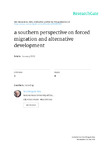
Please use this identifier to cite or link to this item:
http://ricaxcan.uaz.edu.mx/jspui/handle/20.500.11845/467| Title: | A southern perspective on forced migration and alternative development |
| Authors: | Márquez Covarrubias, Humberto Delgado Wise, Raúl |
| Keywords: | Monopoly capital; Civilization crisis; Forced migration; Human development; Human security |
| Issue Date: | 1-Jan-2011 |
| Publisher: | Universidad Autónoma de Zacatecas, Unidad Académica de Estudios del Desarrollo |
| Abstract: | This article analyzes the critical dimensions of the current neoliberal capitalist crisis, particularly the conditions of human insecurity and forced migration fostered by the dynamics of the accumulation model and power system behind neoliberal globalization. We argue that, in the context of free market ideology, the capitalist world system has focused on reinforcing the power of international monopoly capital in the production, finance, service and trade areas via regressive strategies such as labor overexploitation, rentism and the destruction of nature. Large multinational corporations appropriate strategic and profitable segments of peripheral economies and their economic surplus, thereby exacerbating social and territorial inequalities. The reinsertion of peripheral countries into the world economy has fashioned enclave economies specialized in surplus transfer, which diverts both the natural and human resources needed to promote growth, accumulation and development in the Third World. Human insecurity, forced migration and the civilization crisis define the prevailing social conditions in peripheral countries. We propose a reconceptualization of human development from a south-based perspective so as to promote a social transformation that leads to equality, social justice and the common good. |
| Description: | A partir de las dinámicas del modelo de acumulación y el sistema de poder que configuran la globalización neoliberal y que están en la base de la actual crisis por la que atraviesa la humanidad, en este artículo se analizan las dimensiones críticas de la nueva arquitectura que caracteriza al capitalismo contemporáneo. Frente a la ideología del libre mercado, el argumento refiere que el sistema mundial capitalista está orientado a afianzar el poder del capital monopolista internacional en el ámbito de la producción, finanzas, servicios y comercio, mediante estrategias regresivas como la superexplotación laboral, el rentismo y la depredación de la naturaleza. Esta estrategia posibilita a las grandes corporaciones multinacionales apropiarse de sectores estratégicos y rentables de las economías periféricas y despojarlas del excedente económico y recursos naturales y humanos necesarios para alentar sus propias dinámicas de crecimiento, acumulación y desarrollo. Bajo estas circunstancias, las periferias son reinsertadas a la esfera capitalista mundial reeditando economías de enclave que profundizan las desigualdades sociales y territoriales. Desde una perspectiva del sur, se propone una reconceptualización del desarrollo humano para promover la transformación social vinculada a la equidad, la justicia social y el bien común. |
| URI: | http://hdl.handle.net/20.500.11845/467 |
| ISSN: | 2448-7783 |
| Other Identifiers: | info:eu-repo/semantics/publishedVersion |
| Appears in Collections: | *Documentos Académicos*-- UA Estudios del Desarrollo |
Files in This Item:
| File | Description | Size | Format | |
|---|---|---|---|---|
| HM-RDW Southern perspective English.pdf | 836,21 kB | Adobe PDF |  View/Open |
This item is licensed under a Creative Commons License
